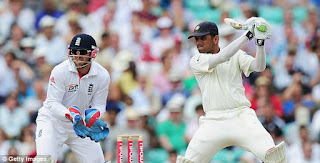"... gladiatorial intensity and monkish one pointedness of purpose; .. glint in the eyes, the eyes of a born warrior marooned in the belly of the Sahara desert with less than a day's ration left...."
- Nirmal Shekar, talking of Rahul Dravid.
As middle school kids in the late 90s, only two things in cricket made sense to us. The runs scored by Sachin and the deliveries 'consumed' by Dravid. We, most of the times, cursed the later for 'wasting' deliveries. (He does hold the world record for facing highest number of deliveries in Test cricket - a whooping 31258!) ODIs, back then to us, meant nothing more than a full furnished version of the 'hit the ball with the bat' game we played on the streets, in the classrooms and into the kitchen!
Only as age grew, the charm of test cricket got revealed. Then did I realize, however nail bitting a thriller was, the beauty of romancing poetry would be the most pleasing of all reading exercises. Then did the craze for men in blue die down and was born the benign bliss of watching the monk in white mediatate through innings of mammoth duration with almost absolute resoluteness. The calmness and dignity, the steadfastness and selflessness - Sometimes, I wonder if Dravid was that philosopher who preached only by practicing.
For most in our generation, born after the Gavaskar and Kapil Dev era into the Tendulkar regime, Indian test cricket and Rahul Dravid are synonymous. Even people who never understood a speck of Test cricket would watch a few overs when the Dravid in white held fort. To be bathed in the radiance of his patient approach were moments to be cherished for.
If as in football, a list of best defenders would be made in Cricket, not many would deny Dravid a rank at the helm. It was not for no reason that he was called 'The Wall' or 'Mr.Reliable'. He was that breed of batsmen who put the highest price on their wicket. No bowler was ever given his wicket, the bowler had to toil to take it. Years ago, rushing out of an exam hall, I called a friend to ask him the score. He told - "Pray God to save wickets at one end." Any guy could have understood Dravid stood at the other end.
A second fiddle like no other, Dravid has been part of some extraordinary partnerships in cricketing history. Many fine innings of Tendulkar, Ganguly and Laxman were carved out in Dravid's company. He stood along when they stood, he stood alone when none stood. In a game of uncertainties, Dravid was for long the certain guardian. Though a specialist No.3, he did open the innings when the team needed him to or came in late at No.6, when that was asked of him. How forget the days when he kept wickets in a bid to stabilize the team's make up.
While men of muscle skied the ball across the boundary, Dravid was more of an artist who worked for the singles and twos as if engineering his way to pursue them. Despite the storms, downpours or scorching heat - the likes of Waqar Younis, Glenn McGrath or Allan Doland - Dravid would water the seeds of an innings unperturbed and see through every stage of its growth, fighting with the grit of a never-die spirited farmer who gave all his to ensure the plant flowered and bear fruits. However high the stakes or however immense the pressure mounted, never a sign of rage. If Indian cricket is an orchestra troop, whose soothing music we have
enjoyed, then the invisible conductor whose face has seldom hogged the
limelight is Rahul Dravid. Always calm, composed and beyond doubt the man for all seasons, either on field or off field.
As I close my eyes and think of Dravid, to my mind always comes a picture. On a field among men in blue I see him in white. He is all set to face the delivery. Shifts body weight to the back foot, waits for the ball and plays his characteristic late cut so late that it appears as if he just pushed the ball out of the keeper's gloves. Before I can completely grasp the beauty of it, he is out of his crease and running.... This time, not to come back again...

